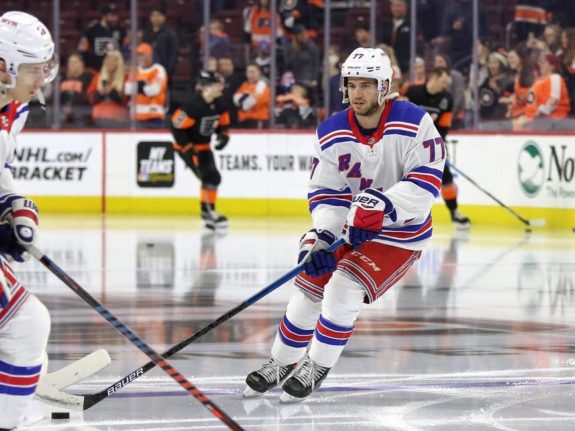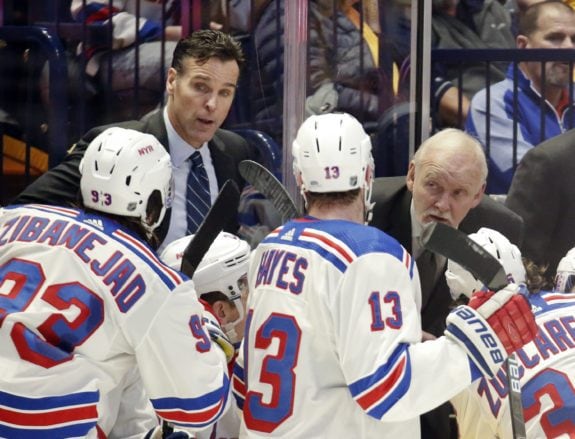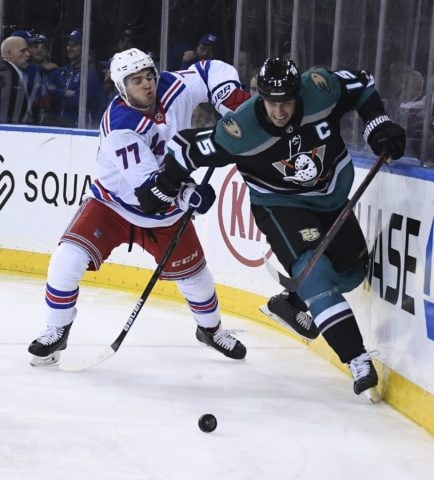An exciting new-look New York Rangers power play debuted in the Blueshirts’ opening preseason game Wednesday, one loaded with talent that was not present last season.
Tony DeAngelo should probably take note.
As the Rangers’ preparation for the 2019-20 season starts to ramp up into high gear, the talented young enigma remains unsigned, with the restricted free agent and club unable to come to terms on a contract.
DeAngelo is within his rights not to be at camp and is hardly on shaky logical ground in holding out. The 23-year-old defenseman recorded 4 goals, 26 assists and a plus-6 rating in 61 games last season, picking up 10 assists on the power play as he appeared to finally be ready to deliver on the promise the Tampa Bay Lightning saw when making him the 19th pick of the 2014 draft.

DeAngelo had the look of a future cornerstone at times in 2018-19. Perhaps that will prove to be the case. The Rangers, though, might need to see a little more before making that commitment financially – and they’re equally justified in holding firm on their reported one-year qualifying offer that might be as low as $874,125.
DeAngelo’s play is worth more than that, and he knows it. Hence the holdout. However, while considering DeAngelo’s statistics in whether to offer him a multi-year deal, there is another category that the Rangers must bring into the equation: incidents involving maturity/discipline issues.
DeAngelo’s Behavior Still in Question
The fiery blueliner’s ledger of transgressions throughout his brief career is well-documented: Problems with teammates, poor on-ice behavior, benchings and suspensions, social media posts and interactions that suggest DeAngelo’s professionalism remains in question.
DeAngelo’s supporters would argue that coach David Quinn’s tough-love approach yielded results in 2018-19 in the form of DeAngelo’s best season, and that he shouldn’t be endlessly punished for his past. The problem with that theory, though, is that the past wasn’t past last season.
DeAngelo was scratched for two games once last season over what Quinn termed a “maturity issue,” and then a second time for one contest about a month later (Quinn calling that one “a little bit of an issue”), with the coach preferring to maintain his policy of not expounding on the reasons for the punishments. DeAngelo also sat for long stretches of games a number of times in 2018-19, his maturity again front and center amid those occurrences.
The counterpoint: Under Quinn’s tutelage, those incidents decreased and were less severe than the ones that have led DeAngelo to his third team in four NHL seasons. That’s a sign of maturation, right?

The counterpoint to that counterpoint: Why are they still happening at all?
Sooner rather than later, DeAngelo needs to put that type of behavior behind him for good and prove to the Rangers or someone else that he can be depended on nightly. That fact that such issues were still present last season may have had something of a chilling effect on the front office’s comfort level with extending even a bridge deal to a tantalizing talent that gave the Lightning and Arizona Coyotes, his first two teams, pause.
At what point does it become fair to label DeAngelo a problem player and not just an immature one? At 23, it’s probably still too early for that. The clock, however, is ticking.
Rangers’ Lack of Cap Space Also a Factor
For that reason, the Rangers can feel justified in wanting to take another one-year look at DeAngelo before declaring themselves fully confident in a decision to commit longer-term to him. A season without incident would, in theory, accomplish that, and DeAngelo’s lack of leverage – he won’t gain arbitration rights as an RFA until next season – represents convenient timing for the front office if that’s the way it’s leaning.
The contract standoff isn’t purely a case of the Rangers playing hardball, of course. The capped-out club doesn’t appear able to fit much more than a qualifying offer into the payroll at this point, with the Blueshirts possibly having less than $3 million in space without any other moves. Clearly, this process is being driven by economics at least as much as DeAngelo’s checkered past.
There’s also the remote but real possibility that another team could render this problem moot for the Blueshirts by extending DeAngelo an offer sheet that the Rangers would likely struggle to match.
Whether he considers it fair or not, DeAngelo should probably take note of what he’s missing by being away. The loaded first power-play unit that featured new presumptive No. 1 defenseman Jacob Trouba at the point could be followed by a second unit with impressive rookie Adam Fox assuming Trouba’s role. Fox – who exhibited poise and patience with the puck in the Rangers’ 4-3 loss to the New Jersey Devils on Wednesday – might prove unready, but if he doesn’t, minutes in the situation in which DeAngelo most excels might be more difficult to come by if and when he gets back on the ice for the Blueshirts.

Make no mistake, the Rangers want DeAngelo manning the right side this season, as they’re not nearly as good a team without him. The defenseman’s holdout negatively affects DeAngelo, but it also hurts the Blueshirts if he gets hopelessly behind in his preparation. Both parties stand to benefit from an end to the absence.
That said, the Rangers’ stance is understandable. With major cap issues playing into it, they don’t seem compelled to bend over backward to make a more expensive multi-year contract fit into their plans – particularly for a player on whom they may still not be sold.
DeAngelo might have to end up trying to prove himself for one more season. If that seems like overkill, he’s the one who has created that reason for any doubt. Accepting a one-year deal and showing he’s truly put the bad stuff in the rearview mirror might be the price he has to pay. As it is, the Rangers may be leaving him with little choice.